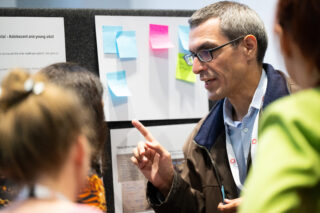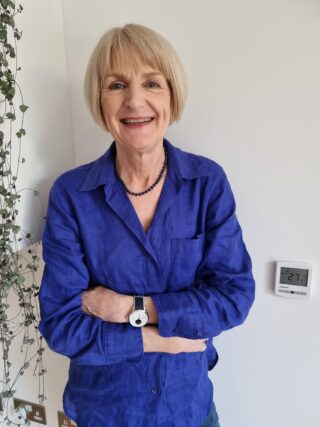Since August 2023, five test teams from England and Wales have been working collaboratively to address issues with flow, build collective ownership and reduce waits.
On 21 September 2023, the test teams, co-researchers and contributors met in London for the first Q Lab workshop. The workshop provided a space for the test teams to share insights from their research and receive input from participants and contributors.

The workshop was also an opportunity to learn more about the Theory of Flow from Flow Coaching Academy and explore how it could be useful for addressing the challenge of wait times. The first session of the day was a presentation on the Theory of flow. Following the presentation, the participants discussed their reflections through a Conversation Café. They were prompted to consider what they were thinking, feeling, or doing about the content that had been shared (see the full slide deck from the workshop)
Across the five groups, the following key topics emerged:
- Providing a language and theory for people’s experiences. While many participants were new to the flow theory, the ideas resonated with their experiences and thinking. As one mentioned, “it’s so much like the conversations we’ve been having in our [community paediatrics] work, just not calling it flow”. The two messages from the flow theory presentation that received the most attention were that demand is predictable and that flow x must equal flow y (in other words, the flow into a service must equal the flow out). These messages seemed obvious, but provided further ideas for participants to explore after being named in an explicit way. Some concepts and theories introduced, such as failure demand and the theory of constraints, also provided ideas for teams to explore. Several participants thought that naming the common issues could help them make a stronger case within their organisation for attention to the need for a joined-up, system approach to tackling waits.
- From fixing issues to system-level redesign. The importance of looking at issues systemically, central to flow theory, strongly resonated with the workshop participants. “You might be able to fix one bit of the system, but change is limited if other parts don’t change – flow theory shows this so clearly.” There were mentions of exciting and innovative practices from the UK and beyond. However, there were also frustrations with how much of the current practice is limited to quick fixes and influenced by risk aversion.
- Participants discussed what is required to support sustainable change in reducing waits in elective care. First, leadership needs to be courageous and have trust in the professionals who are leading innovation and improvement to support them in challenging the established ways of doing. Second, there is also a need to rethink how and when we evaluate the success of initiatives, recognising that a system-level change likely takes longer for the positive impact to materialise. Finally, participants echoed the points made by the Flow Coaching Academy that tackling waits requires collaboration with stakeholders from across the system. Participants discussed different ways to approach this in the current climate and with winter pressures starting.
Sarah Rae offers her reflections on how involving patients from the onset can help bring teams gain a more holistic understanding of the journey that patients go through as they move from one appointment to the next.
“People with lived experience can help those working on flow and reducing waits because they can reinforce the message that, for us, this is not about one isolated aspect of the pathway – it’s a journey. It’s a care pathway that we’ve been on. They may see barriers to flow that are not regarded as important or that people who are working in the system might even dismiss.
We ought to ensure that patient value is designed into the system. So that you’re not just thinking about how the patients will now flow from here to here, but you’re designing in the value to patients at every step of their journey.”
There is a plethora of patient and public involvement toolkits available. For instance, The Patient Experience Library recently shared their analysis of over 500 different PPI toolkits, with an interactive map to help find people the toolkit they need. Sarah’s advice for anyone starting is to remember that co-production and working with patients is messy but that starting somewhere is always more valuable than not engaging patients at all.

Want to follow the Lab?
Join the Q Lab online group and follow the test teams’ work through the regular updates written by the Lab co-researchers.
